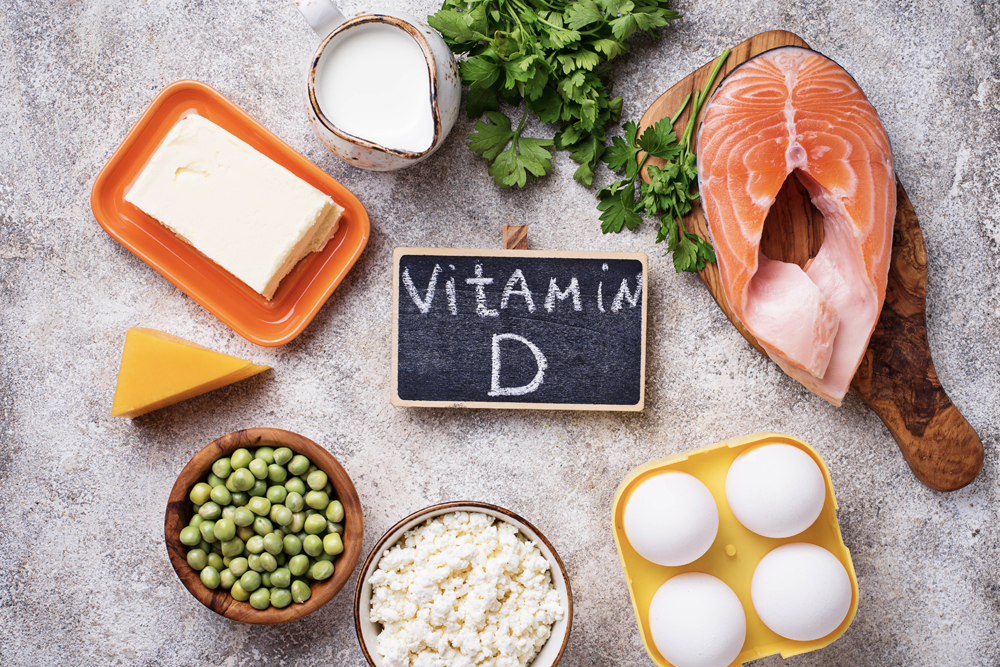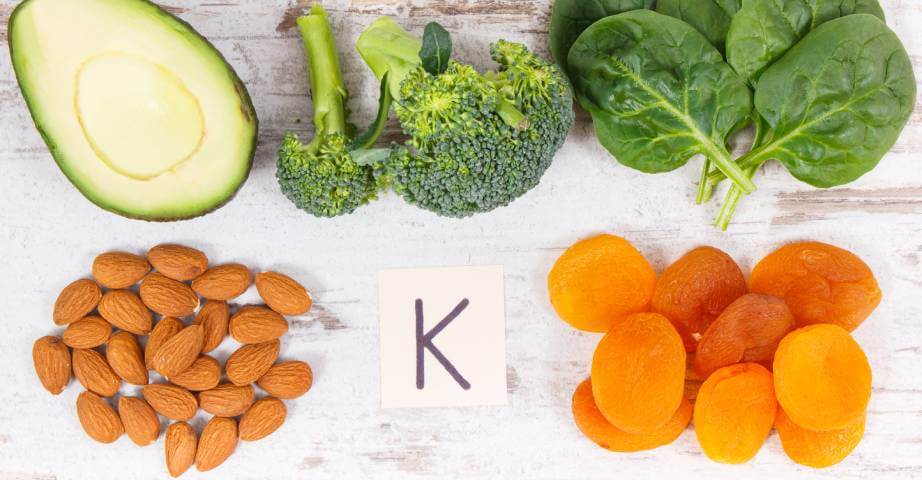Vitamin D3 and K2 - know their meaning!

Vitamin D3 and K2 are two extremely important organic chemical compounds for the proper functioning of the body. An adequate supply of them can strengthen the skeletal system and reduce the risk of injury and trauma. In addition, vitamins can also support the work of other systems in the body.
Why is vitamin D3 worth supplementing along with vitamin K2? And why the compounds are so important in the life of every athlete?
Characteristics of vitamin D3 and K2
Vitamin D3 is a steroidal, organic chemical compound, belonging to the group of fat-soluble vitamins. Vitamin D3, also called cholecalciferol, can be formed from 7-dehydrocholesterol in the skin through the action of UV rays.
Vitamin K2 is an organic chemical compound belonging to the group of fat-soluble vitamins. It is a vitamin that is part of vitamin K, which is one of the derivatives of 2-methyl-1,4-naphthoquinone. There are different forms of vitamin K2, depending on the chain length. The most recommended, and thus the best absorbed by the human body is vitamin K2 MK-7, which contains seven unsaturated isoprenoid residues.
Properties of vitamin D3
Vitamin D3 can perform many important functions in the human body. Its main task may be to support the proper functioning of the immune system. Cholecalciferol may increase the body’s immunity and also support T lymphocytes to fight infections. At the same time, the compound can accelerate the regeneration of the body after the disease.
Vitamin D3 may also play an important role in strengthening bone structure. The compound may support the skeletal system, as well as contribute to increased calcium absorption from the gastrointestinal tract. Cholecalciferol may also participate in the formation of osteoblasts, or bone-building cells, and take an active role in maintaining normal calcium-phosphate metabolism.
The compound may also have a beneficial effect on the functioning of the nervous system. Cholecalciferol can have a neuroprotective effect, increase the plasticity of synapses, and regulate the functioning of the dopaminergic system. Vitamin D3 can also positively affect the level of serotonin, a neurotransmitter called the hormone of happiness.
Vitamin D3 may also affect the cardiovascular system. The compound may modulate thrombomodulin expression, affect platelet aggregation and thrombogenic activity.
Also important is the effect of cholecalciferol on the muscular system - the substance can positively affect the work of muscles and the synthesis of proteins, such as actin or troponin. Vitamin D3 can also affect the metabolism and accelerate the process of fat burning, and thus can be helpful in the process of weight loss.
Sources of vitamin D3 in food
Vitamin D3 can be supplied to the body with sunlight and daily diet. The best dietary source of cholecalciferol may be oily marine fish, such as salmon, herring, eel, tuna and mackerel, for example.
In addition, vitamin D3 in smaller amounts can also be found in:
- meat,
- eggs,
- in ripened cheeses,
- cow's milk.
Properties of vitamin K2
Vitamin K2, like vitamin D3, can perform many important functions in the body.
The compound can support the work of the skeletal system, affecting the density and mineralization as well as bone strength. In addition, it can support their proper development and contribute to faster bone regeneration after all kinds of injuries. Vitamin K2 can also participate in the transport of calcium to the bone, thus preventing the deposition of the element in the blood vessels.
Vitamin K2 can also have a significant effect on the blood system. The compound can contribute to normal blood clotting and elasticity of blood vessels, while protecting them from calcification associated with abnormal calcium management. In addition, the vitamin can have anti-inflammatory and antibacterial effects.
Recommended products with vitamin D3 and K2
Sources of vitamin K2 in food
Vitamin K2 can be produced by bacteria present in the intestines, but can also be found in foods such as:
- meat,
- milk and dairy products, especially long-ripened cheeses,
- eggs.
Vitamin D3 and K2 in the diet of an athlete
Both vitamin D3 and K2 are of significant importance in the proper functioning of physically active people.
Vitamin D3 may affect the overall performance of the body and contribute to the achievement of better sports results. This is due to the fact that colecalciferol can participate in the synthesis of proteins in muscle cells, thus supporting their development and regeneration. In addition, proteins stimulated by vitamin D3 may participate in the transport of phosphorus and calcium to muscle cells, at the same time affecting the strength of contraction and increased energy in muscles.
Vitamin D3 can also participate in the production of testosterone, the action of which can positively affect muscle strength. The compound can also strengthen the skeletal system and promote bone mineralization, thereby reducing the risk of injury and trauma. Cholecalciferol may also have a beneficial effect on muscle regeneration after exercise.
In turn, vitamin K2 can affect bone mineralization, taking care of the right amount of calcium in the body and preventing the occurrence of the "calcium paradox", i. e. the deposition of excess element in the blood vessels, which could result in an increased risk of cardiovascular disease. Vitamin K2 can activate proteins that can regulate calcium absorption, transferring it from blood vessels to bone. Thus, vitamin K2 can strengthen bones and reduce the risk of skeletal injuries.
Vitamin K2 for effective action needs the support of vitamin D3, therefore it can be considered that the duo of these two compounds can be extremely valuable support for athletes.
The need for vitamins D3 and K2
According to the Nutrition Standards developed by the Institute of Food and Nutrition, the requirement for vitamin D3 at the level of sufficient intake (AI) among children and adolescents was determined at the level of 5 ug/person/day. The same value was adopted for adults up to 50 years of age. With age, however, the demand for cholecalciferol increases, which is why among people over 65 years of age, it is recommended to provide the body with 15 ug of the compound/person/day.
The requirement for vitamin K at the level of sufficient intake (AI), according to the Nutrition Standards, is:
- 5-10 ug/person/day for infants,
- 15-65 ug/person/day among children and adolescents and increases with age,
- 55 ug/person/day among adult women, 65 ug/person/day among men.
Deficiency of vitamin D3 and K2 in the body
Insufficient supply of vitamin D3 and vitamin K2 in the human body may contribute to the disruption of the entire system and the occurrence of undesirable symptoms. Most often, deficiency of compounds can be caused by the use of a poorly balanced diet and the occurrence of various diseases.
Causes of vitamin D3 deficiency
Vitamin D3 deficiency in the body may be associated, among other things, with:
- insufficient exposure to the sun, especially during the winter months or as a result of frequent indoors,
- the occurrence of diseases, such as kidney failure,
- the supply of too little compound along with the daily diet,
- aking certain medications.

Vitamin D3 deficiency - symptoms and effects
Insufficient supply of cholecalciferol can manifest:
- as muscle, bone and joint pain,
- by a deterioration of the body’s immunity and thus an increased susceptibility to infections,
- by increased susceptibility to bone damage and fractures,
- by painful muscle cramps,
- as deterioration of the condition of the skin, hair and nails,
- as a weakness,
- as mood swings.
Too low supply of vitamin D3 may increase the risk of developing osteoporosis and osteomalacia.
Causes of vitamin K2 deficiency
Too low levels of vitamin K2 in the body may be associated with the occurrence of:
- absorption disorders,
- obstruction of the bile ducts,
- malnutrition
- long-term antibiotic therapy,
- a diet low in the source of the compound.
Vitamin K2 deficiency - symptoms and effects
Vitamin K2 deficiency can cause, among other things:
- a decrease in the ability to bind calcium in the bones,
- a decrease in bone mass,
- increased susceptibility to fractures,
- increased risk of developing osteoporosis,
- increased risk of calcification of arteries or congestions,
- prolonged wound healing,
- deterioration of blood clotting.
Supplementation with a complex of vitamins D3 and K2 - why is it worth taking them together?
In many dietary supplements, vitamin D3 is accompanied by vitamin K2. Is this pure coincidence, or is the combination of compounds justified?
Vitamin D3 and K2 are the perfect duo that can strengthen bones and positively affect the work of almost the whole body. These compounds should be taken together, because the lack of vitamin D3 in the body may cause that the action of vitamin K2 will be ineffective.
Since both vitamin D3 and K2 are fat-soluble compounds, it is worth providing them to the body along with an additional source of fat, which will facilitate their absorption and assimilation.
Before starting supplementation with preparations containing vitamin D3 and vitamin K2, it is worth doing appropriate laboratory tests. The results - consulted with your doctor or pharmacist - may allow you to determine whether taking vitamin products is actually needed.
If so, it is worth choosing proven and safe supplements – you can find them in the OstroVit offer, among others:
- OstroVit Vitamin D3 4000 + K2 100 tablets - a supplement with ingredients of natural origin, which were placed in an economical package - the product contains up to 100 tablets, which is enough for 200 days of supplementation,
- OstroVit Vitamin D3 + K2 90 tablets - a supplement with vitamin D3 enriched with vitamin K2 in MK-7 form (best absorbed). Package of 90 tablets is enough for 3 months of supplementation,
- OstroVit Vitamin D3 + K2 Liquid 500 ml - dietary supplement in the form of a liquid based on natural fruit juices; convenient form of administration and addition of vitamin C - these are the main advantages of the product,
- OstroVit Vitamin D3 + K2 + Calcium 90 tablets - a dietary supplement with vitamin D3 and K2, the composition of which, for even better support of bone strength, has been enriched with calcium.
Choosing OstroVit supplements, you can be sure of the effectiveness of their use. This is because all the preparations offered by the brand have passed the appropriate tests for the content of individual components.
Excess of vitamin D3 and K2 in the body
An excess of vitamin D3 and K2 is extremely rare.
Too high levels of vitamin D3 in the body may be a consequence of long-term intake of high doses of dietary supplements containing this ingredient. It is impossible to overdose vitamin D through exposure to the sun or with daily diet.
Too high a supply of cholecalciferol can manifest as nausea, vomiting, constipation, headaches, and decreased appetite. May promote the occurrence of kidney stones and kidney damage.
An excess of vitamin K2 in the body can also occur as a result of improper intake of dietary supplements. Overdose of the compound may be manifested by excessive sweating and a feeling of heat.
Excessive supply of vitamin K2 can contribute to liver dysfunction as well as breakdown of red blood cells.
For this reason, before starting to take dietary supplements rich in these ingredients, it is worth performing appropriate blood tests to determine whether the use of preparations is necessary at all. When using supplementation, always follow the manufacturer’s recommendations on the product packaging.
Bibliography:
- https://www.researchgate.net/profile/Katarzyna-Jobs/publication/290473558_Pleiotropic_effects_of_vitamins_D_and_K/links/56d6cbe508aee1aa5f75a2aa/Pleiotropic-effects-of-vitamins-D-and-K.pdf
- http://www.pnmedycznych.pl/wp-content/uploads/2017/02/pnm_2017_031_036.pdf
- https://www.tandfonline.com/doi/full/10.3402/fnr.v56i0.5329
- https://pubmed.ncbi.nlm.nih.gov/32808059/
- https://journals.viamedica.pl/forum_medycyny_rodzinnej/article/view/55760
- https://www.infona.pl/resource/bwmeta1.element.psjd-56da4d2a-24cc-4f76-a016-e581df13bb06
Data ostatniej aktualizacji: 03.01.2023
